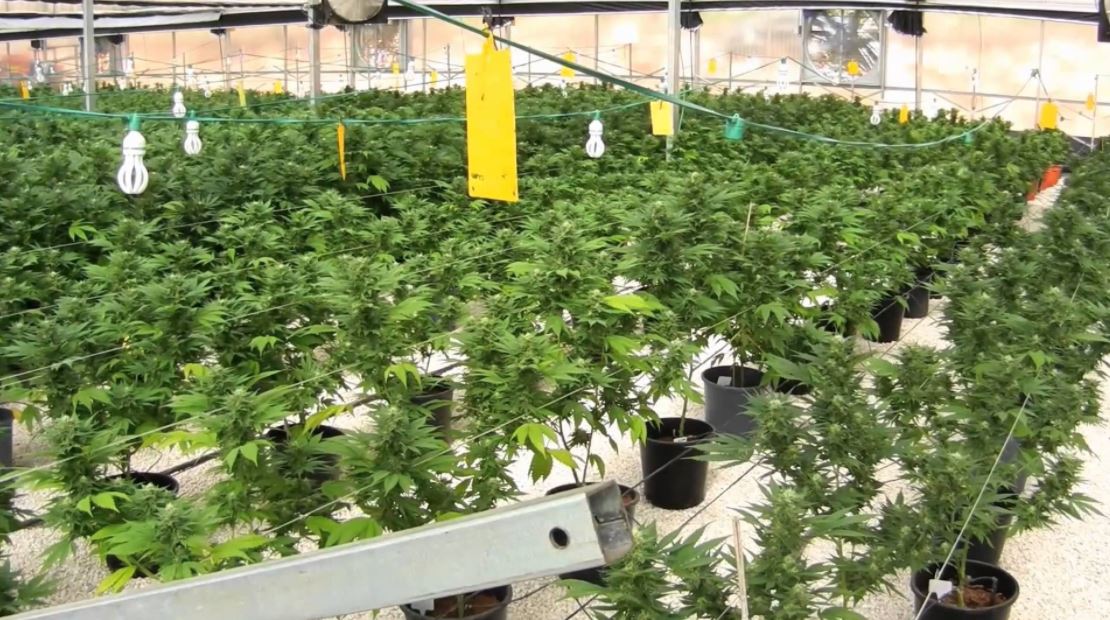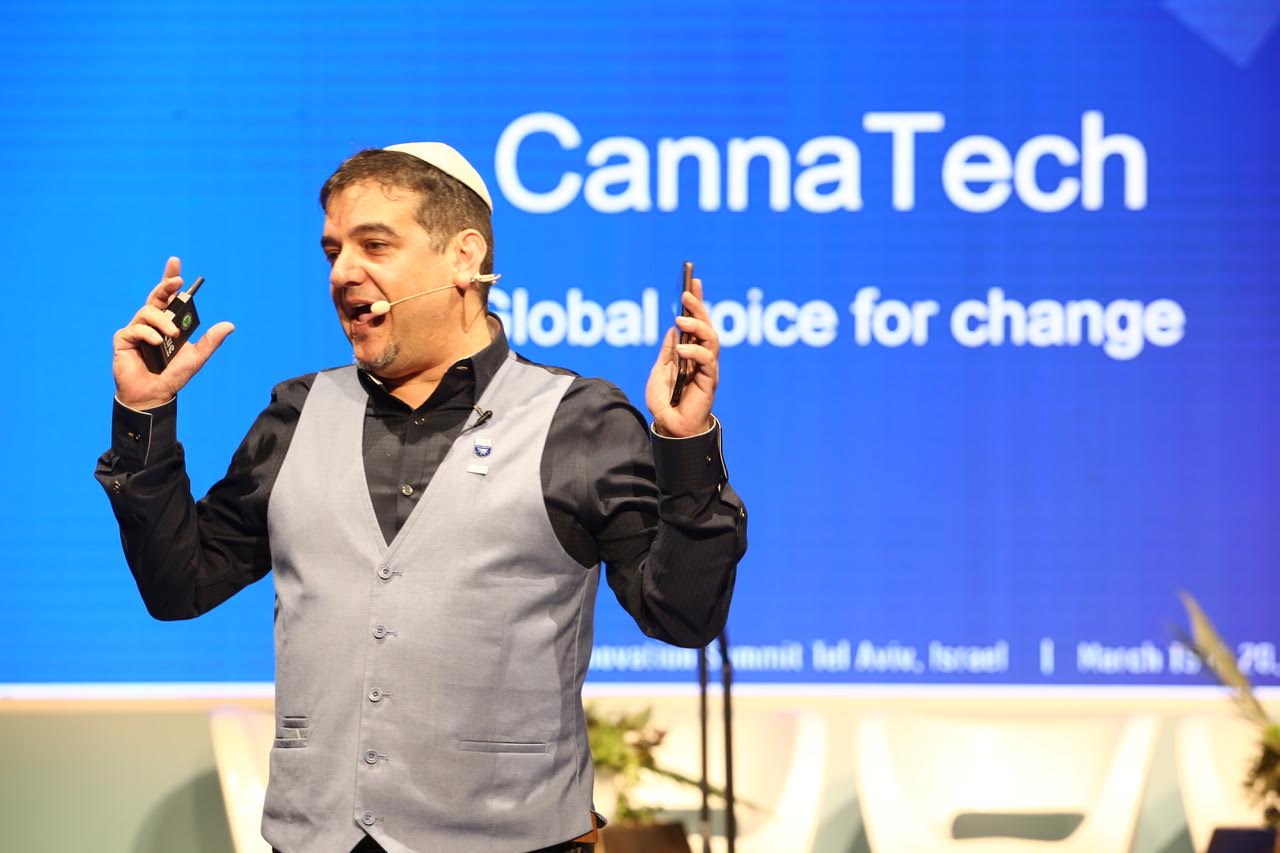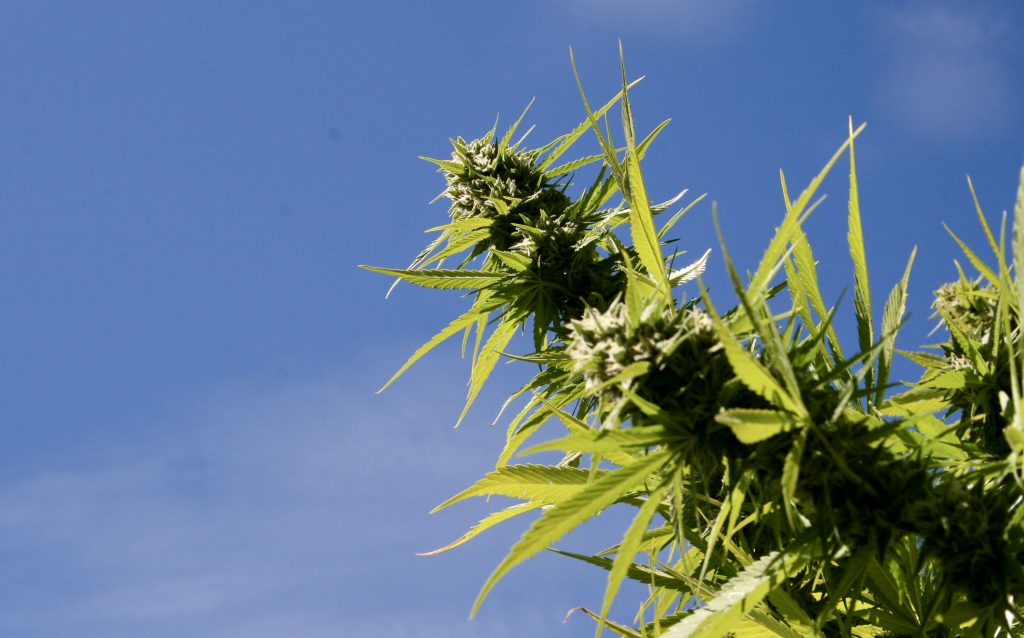The Israeli government stands to miss out on a massive opportunity to be a world leader in a sector estimated to start bringing in $1 billion in annual revenue, if a medical cannabis export freeze ordered by Prime Minister Benjamin Netanyahu remains in place, warned Saul Kaye, CEO of Israeli cannabis-focused global accelerator iCan: Israel-Cannabis, on the first day of the annual CannaTech convention in Tel Aviv on Monday.
Speaking during a press conference with other Israeli medical cannabis industry experts, Kaye, who is also the CEO of the group that runs CannaTech conferences around the world, added that if the government fails to see the advantages of Israel’s participation in the medical cannabis market, companies in the cannabis space will just move their operations elsewhere.
“Exports are going to happen. If not here, then we’ll go to another country,” he told NoCamels.

Left to right: Saul Kaye, CEO of CannaTech; Yona Levy, CEO of Alvit Pharma; Ma’ayan Weisberg, head of International Relations at Tikkun Olam Ltd. and Avihu Tamir, CEO of Kanabo Research, speak at CannaTech conference. (Tal Pais, Photogenim)
Last month, NoCamels reported that Netanyahu had decided to suspend reforms that would allow the legal export of cannabis plants for medicinal purposes, amid opposition by the Ministry of Public Security, which said it was afraid that it would spill over into the recreational market. A reported conversation with US President Donald Trump was also said to be the cause of the sudden export freeze.
SEE ALSO: Medical Marijuana Farmers Plan Day In Court Over Freeze On Medical Marijuana Exports
But cannabis industry leaders remained largely optimistic throughout the CannaTech event, which attracted over 800 participants from 40 countries. In a session titled ‘The Politics of Cannabis: Spotlight on Israel: What Reclassifying Means for Export & Economy”, Yuval Landschaft, Director of the Israel Medical Cannabis Agency of the Ministry of Health suggested everyone “relax” and that “almost everything is going to be solved.”
Yuval Landshaft, director of the Medical Cannabis Unit in the Ministry of Health #cannatech pic.twitter.com/T6VKZks5PC
— CannaTech (@Canna_Tech) March 20, 2018
“The government of Israel believes Israel can be the ‘Start-Up Nation’ of cannabis,” he said, “Our prime minister himself wants to know the benefits and that’s why he is rechecking the regulations. Nothing has stopped.”
Landschaft said the export freeze could end “as soon as April” when government officials and other experts gather for Cannaan, the state-backed three-day medical cannabis conference taking place in Ramat Gan at the end of next month. The event is touted as “the 1st international conference of medical grade cannabis” in Israel despite the first CannaTech summit four years ago. The convention is expected to “attract scientists, regulators, medical personnel, farmers, and policy stakeholders, interested in the vibrant field of medical cannabis.”
Keynote speakers include Israeli organic chemist Professor Raphael Mechoulam, known as the “father of medical cannabis research.” Israel is considered a pioneer in marijuana research largely thanks to Mechoulam of the Hebrew University of Jerusalem. Through his research in Israel in the 1960s, he was the first scientist in the world to identify various compounds of cannabis, including THC, the chemical known for causing a “high.”
‘We’re going to do deals anyway’
The panel of speakers at the CannaTech summit included Kaye as well as cannabis tech heavyweights like Yona Levy, CEO of cannabis pharma company Alvit Pharma; Ma’ayan Weisberg, head of international relations for cannabis developer and distributor Tikun Olam and Avihu Tamir, CEO of Tel Aviv-based cannabis R&D company Kanabo Research. They all indicated they would look for other ways to promote their technology as long as regulations remain restrictive and the export ban continues.
Some are already taking this path. Earlier this week, Israeli medical cannabis company Globus Pharma announced a partnership with Together, a firm that specializes in growing and producing medical cannabis in Israel and exporting its products abroad, to build and operate a complex of greenhouses in another country. The aim would be to market and export up to about 60 tons of medical cannabis annually, at an estimated value of $75 million in initial revenue, the two companies said.
And earlier this month, Medivie Therapeutic, one of Israel’s biggest medical cannabis firms, announced a deal worth $110 million to grow and export medical cannabis to an unnamed foreign investor over a four-year period.
Sign up for our free weekly newsletter
SubscribeIn the case of Tikun Olam, the largest supplier of medical cannabis in Israel, Weisberg says that the company is not counting on exports and has already set up partnerships abroad because of restrictive regulations in the past.
“It is a shame the government here is not seeing the potential because we do believe we are able to provide so much work and income for this country,” she said during the press conference.

Tikun Olam has a medical marijuana dispensary in Tel Aviv but grows its plants in the north of the country. Courtesy
“We’re going to do deals anyway,” she told NoCamels later, “It’s unfortunate that the Israeli government will suffer.”
Tikun Olam currently has a licensing agreement with MedReleaf, a company that grows, processes, and distributes Tikun Olam cannabis strains in Canada, currently the only country that has approved the export of medical cannabis. There are similar partnerships in Australia, South Africa, and the UK, and the company also established its US operations in 2015 as Tikun Olam USA.
Cannabis research
While Israel has suspended the export of cannabis-related products, for the time being, it does allow for the growth of marijuana for the purpose of medical research. Israel is one of the few countries where medical marijuana is allowed to be tested on human beings in clinical trials.
Israeli researchers have continued to use cannabis to make great headway in medicine and healthcare, using it to attempt to kill cancer cells, treat traumatic brain injuries, possibly treat autism, and provide pain relief.
This is all done with strong encouragement from the Israeli government, which also invests in the industry. In 2017, the Israeli government said it would invest $2.13 million in 13 research projects on cannabis, making Israel one of three countries with a government-sponsored cannabis program.
And Tikun Olam, for its part is currently in the midst of 15 cannabis-related clinical trials in Israel for autism, Parkinson’s disease, IBD, fibromyalgia, geriatric care, inflammation, cerebral palsy, epilepsy, and cancer, according to Weisberg.

Saul Kaye, CEO, iCAN: Israel-Cannabis and CannaTech opening the CannaTech Israel conference in Tel Aviv.
The prevailing sentiment among Israel’s medical cannabis experts at CannaTech was that the government doesn’t know how to regulate in a way that is appropriate.
This may be why they selected Israeli startup Otorize as the winner of the Live Pitch event to close out the summit. Otorize developed an app that prevents impaired driving under the influence of drugs or alcohol, through tests that identify cognitive impairment, determining whether a person is fit to drive.
SEE ALSO: L’HIGHim: Medical Cannabis Firm Inks $110M Deal, As Future Of Exports Still Uncertain
The session was a friendly competition featuring pitches from five early-stage cannabis-based startups including Verticanna, which provides the design and manufacturing of smart hydroponic cultivating systems, and Indorz, a company that delivers scalable facility optimization technology for cannabis greenhouses, enterprises, and indoor grow facilities.
Otorize impressed a panel of judges that included Kaye, serial entrepreneur Lorne Gertner, co-founder and former chairman of PharmaCan Capital Corporation (
“It’s a great time for this app, as regulators are trying to find ways to control the cannabis market,” said Gertner after the pitch.
Related posts

Editors’ & Readers’ Choice: 10 Favorite NoCamels Articles

Forward Facing: What Does The Future Hold For Israeli High-Tech?

Impact Innovation: Israeli Startups That Could Shape Our Future




Facebook comments